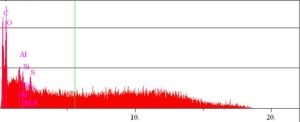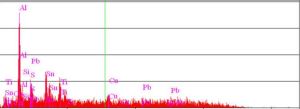Possible Bromine on Electrolytic Capacitors
Gideon Analytical Laboratories received two power supply boards with components. The supplies were thought to have contamination, possibly bromine, causing corrosion or failing the electrolytic capacitor. The term electrolytic capacitor in a generic term for three different capacitors, which include aluminum electrolytic capacitors, tantalum electrolytic capacitors, and niobium electrolytic capacitors. All electrolytic capacitors are polarized capacitors whose anode is made of a particular metal on which an insulating oxide layer forms by anodization, acting as the dielectric of the electrolytic capacitor. Electrolytic capacitors may corrode if used or stored in a place where they encounter acidic toxic gases, like hydrogen sulfide, sulfurous acid, nitrous acid, chlorine, or bromine.
Failure analysis was conducted using SEM-EDS to inspect the electrolytic capacitors. Many scans were performed on various areas of the capacitor to attempt to find the bromine, including the base, the solder mask, the anode lead, the flux on the PCB, and other locations. Overall, over 100 scans were taken. Based on the analysis, the power supply boards and electrolytic capacitors were judged to be free of bromine.
Gideon Analytical Laboratories is a global leader in providing problem- solving for companies in the electronics industry. We have done work for companies all over the world. Our people have over 70 years of combined experience with chemistry, materials, and electrical engineering. We have the motivation, the knowledge, and the analytical equipment to solve any problem. Trust us with your failure analysis needs. Give Gideon Analytical Laboratories a call today.

Spectrum on the flux from PCB

Spectrum for base of anode